
In 1945, 51 states signed the United Nations Charter, declaring their intention “to save succeeding generations from the scourge of war.” In order to make good on this aspiration, the drafters of the charter upended centuries of political and legal practice: Aggression would no longer be tolerated; henceforth, the only just causes for war would be self-defense and the maintenance of international peace and security, which could be understood as the defense of others. In 1949, the United States changed the name of the Department of War to the Department of Defense, a move that reflected, at least implicitly, an intent to help build and protect this new international order (nominally) built around aspirations of mutual cooperation, of international comity, of peace and security for all.
War, then, was supposed to be a relic of the past—a dirty word, a ghost. But history is a singular horror, and ghosts continue to haunt and wreak havoc upon the living.
The United States was a key signatory to the UN Charter. But in the years after the signing of the convention, the US, either directly or via proxies, proceeded to kill untold millions across the globe in an effort to shore up and expand its hegemony within the new world-system. What had changed was its explicit justification for doing so. No longer were military campaigns waged in the name of manifest destiny or colonization—now, from Vietnam to Korea to Grenada (yes, even Grenada), conflicts were justified by reference to self-defense or the defense of others. The dead continued to mount—all that had changed, it seems, was the paperwork.
Still, even paperwork has its uses. The fact that the United States and other powerful states behaved as if the law of war mattered, even as they continued to violate it, gave the law a weak regulatory function. As legal scholar Frédéric Mégret writes, the basic prohibition on the threat or use of force against another State’s territorial integrity or political independence compels governments ”to argue their claims in the commonly accepted language of law.” That is, as long as all states speak as if the law were operative, claims regarding the legitimacy of the use of force will be evaluated according to a (more or less) shared rubric, and it is these evaluations that enable states to identify and bring coordinated political measures to bear on violators.
Such measures may also be discursive—but even here, political delegitimization can lead to concrete consequences, whether internal unrest, the severing of economic or diplomatic relations, or even military action, as in Ansar-Allah’s campaign against Israel for its genocide in Gaza, which speaks the language of and seeks to vindicate law as such even as it is condemned as illegal.
Though the liberal international order is itself tainted and delegitimized by the violence of its origin and its upkeep, it represents, at least in theory and even occasionally in practice, a check on domination, a means of forcing a formal equality between the powerful and the weak before the law such that the latter might find some protection from the former and be afforded the space to work toward a world where such differences no longer pertain.
That order is now crumbling, and the United States seems more than happy to usher it out. It makes sense, then, that Trump’s relation to international law is qualitatively different from that which preceded him. What we are seeing now from the Trump administration is a US empire increasingly willing to dispense with even the perfunctory legal legitimation that past presidents leaned on.
On September 2, the Trump administration authorized a drone strike against a small boat in international waters off the coast of Venezuela, killing all 11 people on board. Trump tweeted that same night that “the strike occurred while the terrorists were at sea in International waters transporting illegal narcotics, heading to the United States. The strike resulted in 11 terrorists killed in action.”
Trump claimed, without evidence, that the people on board the boat were members of the Tren de Aragua gang (which has been disputed by the Venezuelan government), though the mandatory War Powers Report filed two days after the strike only refers vaguely to an unnamed “designated terrorist organization.”
Officially, the administration sought to justify the strike as an act of self-defense, stating that the military was forced to act “in the face of the inability or unwillingness of some states in the region to address the continuing threat to United States persons and interests emanating from their territories.” At a press conference in Mexico, Secretary of State Marco Rubio justified the attack alternatively as an act of self defense against an imminent threat, as well as self-defense against the more nebulous and distant possibility that profits from the alleged drugs on board the vessel would be used to “destabilize governments in the region which in and of itself then poses a threat to the United States.”
Many, including Venezuelan President Nicolas Maduro and Colombian President Gustavo Petro, have denied that the boat was being used for drug smuggling at all—and insisted that, as Petro stated at the UN in late September, whether the people on board were smugglers or immigrants or fishermen, they were “young people who simply wanted to escape poverty.”
As numerous legal scholars have pointed out, the Venezuela attack was plainly illegal. Even if the boat were carrying members of a designated terrorist organization, even if these 11 people were trafficking drugs, and even if those drugs were indeed bound for the United States, this strike was nothing more than murder. Self-defense can be used only to repel an armed attack—drug trafficking cannot be considered, in any world, an armed attack, and it thus posed no imminent threat.
Drug traffickers may be criminals, but they are not combatants—which is to say, they are civilians, and civilians cannot be targeted and killed when not taking part in hostilities. They can be arrested, and the Trump administration itself acknowledged that this was a possibility. But, as Secretary Rubio said in Mexico the day after the strike, “instead of interdicting [the boat], on the President’s orders, we blew it up.”
Since the September 2 strike, two more strikes have been carried out against civilians in Caribbean waters. Again, no evidence was presented regarding the cargo or personnel of the targeted boats; again, the strikes were illegal regardless. Unlike the first strike, no attempt at legal justification was provided for the subsequent strikes. The use of force, always the last resort under international law, instead became the first.
These strikes have not taken place in a political vacuum; they are, in many ways, a continuation of the so-called Global War on Terror (GWOT). Indeed, after the second strike, FBI Director Kash Patel said that the US will treat alleged drug traffickers “like the al Qaedas of the world.” What’s more, the language used by the Trump administration here—“imminent threat,” “terrorist,” “unwilling or unable”—is itself a continuation of the so-called GWOT policies and rhetoric of George W. Bush and Barack Obama, both of whom bear significant responsibility for bringing us to the present moment.
When Bush launched the GWOT, he declared, “Our war on terror begins with al Qaeda, but it does not end there. It will not end until every terrorist group of global reach has been found, stopped and defeated.” The entire world, then, became a battlefield.
But the concept of battlefield traditionally functions as a way to delineate where killing may take place and where it may not. It is, therefore, a core concept for international humanitarian law. If the battlefield is everywhere, then it is nowhere. And if it is nowhere and the killing continues, then what has opened up are not battlefields, which are necessarily circumscribed, but killing fields, which know no bounds.
Or rather, the mere designation “terrorist” creates the battlefield wherever that “terrorist” may be. Because the battlefield became bound to persons instead of territories, the United States was able to disregard state sovereignty and create killing fields across the globe simply by designating someone, anyone, in a given territory as a terrorist.
This is precisely the role of the word “terrorism” in state discourse: to deterritorialize conflict, and thus also to sweep aside legal concerns that depend in part on territorialization for their application. If there is a “terrorist” within a state’s borders, the logic goes, those borders cease to exist—the “battlefield” has expanded. If a state did not want its territory to be bombed, the US argued, it should have acted to remove the terrorists residing within its territory (Israel recently repeated this same rhetoric at the UN, and has demonstrated its willingness to follow up in practice).
As scholars Devika Hovell and Michelle Hughes point out in an overview of the legality of Bush’s so-called GWOT, the Bush administration relied upon expansive understandings of both complicity and the “unwilling or unable” standard to justify its attacks against or within the territory of sovereign states. In the former case, with respect to Afghanistan, the Bush administration asserted that by granting permission to a “terrorist” group to reside within their territory, the Taliban became complicit in any attacks that emanated from that territory (an understanding in direct contravention of decades of international law).
Likewise, Bush’s incursions into other countries around the world were justified under an expanded use of the already capacious “unwilling or unable” standard, effectively permitting the administration to conduct military activity in any state so long as it has decided that the target state has not acted with sufficient seriousness in pursuit of US interests.
But whereas Bush’s GWOT was lumbering and loud, Obama worked to streamline the military’s deployment, while simultaneously extending its theater of operations and formally (if not actually) curbing some of its worst abuses. He was able to accomplish this through the expansion of the drone program, carrying out roughly 10 times the number of drone strikes as the Bush administration and expanding those strikes into new territories, like Yemen and Somalia.
In 2013, a memo authored by Obama administration lawyers was leaked to the press. It outlined the administration’s legal framework for the murder-by-drone of American citizen and Al Qaeda operative Anwar al-Awlaki, a framework that applied perforce to noncitizens as well. The memo rehashed the old Bush administration justifications for the use of force on the territory of another state, which by then had become de facto, if not yet entirely de jure, accepted by the American establishment.
The killing of a US citizen abroad, the Obama lawyers argued, could be justified under existing law only if the target constituted “an imminent threat of violent attack to the United States.” Imminent, as we all know, means “just about to occur”—a fact that would seem to preclude the kind of constant and generalized permission to kill typical of war, which was precisely the kind of permission the Obama administration was after.
In order to get around the strictures of the English language, the Obama lawyers simply changed the definition of the word. They wrote that if “the al-Qa’ida member in question has recently been involved in activities posing an imminent threat of violent attack against the United States, and there is no evidence suggesting that he has renounced or abandoned such activities, that member’s involvement in al-Qa’ida’s continuing terrorist campaign against the United States would support the conclusion that the member poses an imminent threat.” Which is to say, regardless of what one is planning to do, about to do, or will do, if one belongs to a terrorist group, one is an “imminent threat” who can be assassinated.
Just as imminence became ontological instead of temporal, so too did Bush and Obama change terrorism from an activity-based crime into a status crime—a thing one is, not a thing one does. As I’ve written elsewhere, this designation functions as a way to provide further legal cover for the creation of killing fields or region-wide free-fire zones—a circular logic predominates: “We have marked all terrorists for death, a status only we can impose or remove, and thus your death will always serve as its own justification.” As we have seen in both American and Israeli discourse, “terrorist” has come to be a racial epithet, attaching to all Palestinians, all Muslims, all Arabs, and now, increasingly, all migrants (documented or otherwise)—the circular logic becomes a logic of genocide as well.
Trump’s predecessors dealt mortal blows to the rule of law, but they were not yet ready to break with the international legal order as such. Each made sure to couch even their worst abuses in the language of the law and to provide ex-ante legal cover for their actions; a pseudo-legitimacy that was at once more insidious in the sense that it operated largely as a smokescreen, but that also preserved the seeds of its own delegitimization by continuing to speak within the same shared discursive space as its critics.
Even more importantly, Bush sought international legal legitimacy for both the invasion of Afghanistan and, less successfully, the invasion of Iraq. That the campaign for the latter was downright farcical does not undermine the fact that the Bush administration—which had, in any event, already determined to proceed with the invasion—felt the need to garner support for its war from the international community.
Trump, by contrast, appears uninterested in even pretending he cares about international law. Though it employed familiar rule-of-law tropes, the legal justification for the first strike on Venezuela, a mere one-page memo with almost no factual details and no analysis whatsoever, was conjured only after the fact. Legitimation for subsequent strikes were exclusively couched in moral and political, not legal, terms. To be a cartel member is to be a terrorist is to be killable, the logic seems to go.
And again, states are in the crosshairs as well: Trump’s bellicose rhetoric against Venezuelan President Nicolas Maduro and his repositioning of significant naval assets to the southern Caribbean are possible preludes to military action against Venezuela itself under the repeatedly debunked pretext that Maduro is controlling Tren de Aragua’s activities, a pretext which, again, even if it were true, would still make any prospective strike illegal.
But this is precisely the point: Neither the law nor the liberal international order matter to this administration, except insofar as they are impediments to action.
As Vice President JD Vance tweeted, “Killing cartel members who poison our fellow citizens is the highest and best use of our military.” When Brian Krassenstein, of all people, responded by correctly calling the strike a war crime, Vance replied, “I don’t give a shit what you call it.” In other words, if the law is a constraint, fuck it. This is the US’s world, and nobody is going to tell it how to act. After 9/11, George Bush told the world: “Either you are with us, or you are with the terrorists.” Now the Trump administration declares: There is only us.
If the liberal international order previously allowed the United States to shore up its legitimacy as world hegemon, it is no longer fit for purpose. That is, the US has lost its quasi-monopoly of both the world economy and political power and legitimacy within the international system, and the institutions of that system—what we have been referring to generally as the liberal international order—have thus become a hindrance instead of a useful tool to US empire.
Rather than adapt to the changing world-system, the US has decided that it no longer needs nor craves legitimacy, particularly as it apparently gears up for a new round of conquest and diplomacy-by-bomb in an effort to combat and contain China and (futilely, one hopes) rewind the structural crisis in which it finds itself.
Had other countries not exhibited an extreme obsequiousness and cowardice vis-à-vis the American project, the shared discursive space of international law could have been utilized more effectively. But for decades, most states have allowed the US to run roughshod over the same institutions it claimed to protect and lead. At once, the liberal international order expanded its reach into more and more areas and claimed for itself ever greater legitimacy while, just beneath the surface (or just above it), the US and its proxies steadily chipped away at the promise of protection and equality by which the order sought to legitimate itself.
The so-called GWOT pushed this contradiction to a point where it must be resolved. That is, if 2001 was the first time the split engendered by this crisis became fully visible, we are now at the moment when this global bifurcation is becoming impossible to ignore. What we are now witnessing is an opening salvo in the long struggle to resolve this crisis in which, to borrow from Immanuel Wallerstein, “the demise of the existing historical system is certain and which therefore presents those found within it with a real historical choice: what kind of new historical system to build or create.”
The Trump administration’s actions in Venezuela represent one answer. Israel, which is two years into committing genocide in Gaza with US support and has, in just one week, also bombed Tunisia, Qatar, Syria, Yemen, and Lebanon—answers in unison with its protector (I do not mean to equate the two—but both, though different in degree and in kind, are early examples of the emerging new international order, and statements of intent for the future). It is difficult, impossible even, to now imagine either country seeking Security Council approval, or even General Assembly support, for war. Together, America and Israel are rapidly working to return to the world to the days of might makes right, to the vile days of conquest and direct domination.
By turning large swaths of the world into killing fields, Bush and Obama opened the gates of hell, but their commitment to the nominal preservation of the liberal international order prevented them from fully diving in even as the ground gave way beneath them. Their crimes are innumerable and unforgivable—but they were crimes which took place with one foot in the old world, even as they signaled its terminal decadence.
The advent of the so-called GWOT, that is, represented the last moment where the world might have been able to pull back from the brink of generalized violence and subjugation through the utilization of existing structures without requiring a transformational change in the nature and operation of those structures themselves. That option is gone—it was murdered, first and foremost, in Palestine; it was murdered in the Caribbean too—and there is no going back.
Popular
“swipe left below to view more authors”Swipe →
Three days after the strike off the coast of Venezuela, President Trump signed an executive order changing the name of the Department of Defense to the Department of War. “The name “Department of War,” the order reads, “more than the current ‘Department of Defense,’ ensures peace through strength, as it demonstrates our ability and willingness to fight and win wars on behalf of our Nation at a moment’s notice, not just to defend.” Newly christened Secretary of War Pete Hegseth stated, while reading a strange little poem to announce the name change, that the US military was now all about “maximum lethality, not tepid legality; violent effect, not politically correct; we’re gonna raise up warriors, not just defenders.”
As far as the United States is concerned, the aspirations of the UN Charter—a world without aggression, and ultimately, without war—have been declared dead and, in any event, undesirable. The world-system as we know it is over. America, along with Israel, has apparently chosen what kind of system it intends to build in its wake: a new era of slaughter against the world’s political and economic surplus populations, a world untethered from even the pursuit of equality and peace, however half-hearted or illusory that pursuit may have been.
I want to be very clear: The liberal international order has meant little more than mass murder and suffering for the global majority. Under its auspices, millions were killed, billions more cast into neocolonial subjugation. But it contained within it an emancipatory kernel—never realized or earnestly pursued—but one that, if insisted upon without compromise, had the potential to usher in a better world than the one before it. The demand that international law be applied as law, to the powerful and the weak alike, contains within it a stand-in for global revolution.
Such a demand can only be realized by a fundamentally new order. That is, the only way that states can achieve this discrete and facially modest demand is to collectively dismantle US domination of the world-system. To do it from within and through the institutions of the present liberal international order makes the demand more easily cognizable and more destructive to the actually existing world-system because it is immanent to it. The new order proposed by America and Israel will contain no such kernel, and as it matures it will increasingly, if not exclusively, need to be opposed from forces operating outside what institutions may remain. Violence will beget counter-violence—either way, unlimited violence will be the order of the day.
The old order had to die, but the timing is inauspicious—the forces opposing the burgeoning fascist-international are relatively weak and disorganized; our task now is to build them where they don’t exist and to support them where they have already taken up the fight.
The world cannot afford to sit on its hands: The genocide in Gaza and the looming conflict in Venezuela (and elsewhere) are statements of intent, early examples of this nascent new order. An overriding moral imperative demands that both must be stopped, but prudential, self-protective reasons militate toward action as well. We may have glimpses into the coming nightmare, but nothing has yet been decided. The choice is still there: Follow America and Israel into hell, or push them in along with the rotten old world they helped destroy, and close the gates for good.
More from The Nation
The plan for Gaza does not promise an end to Israel‘s genocide—but does promise indefinite occupation.
Phyllis Bennis
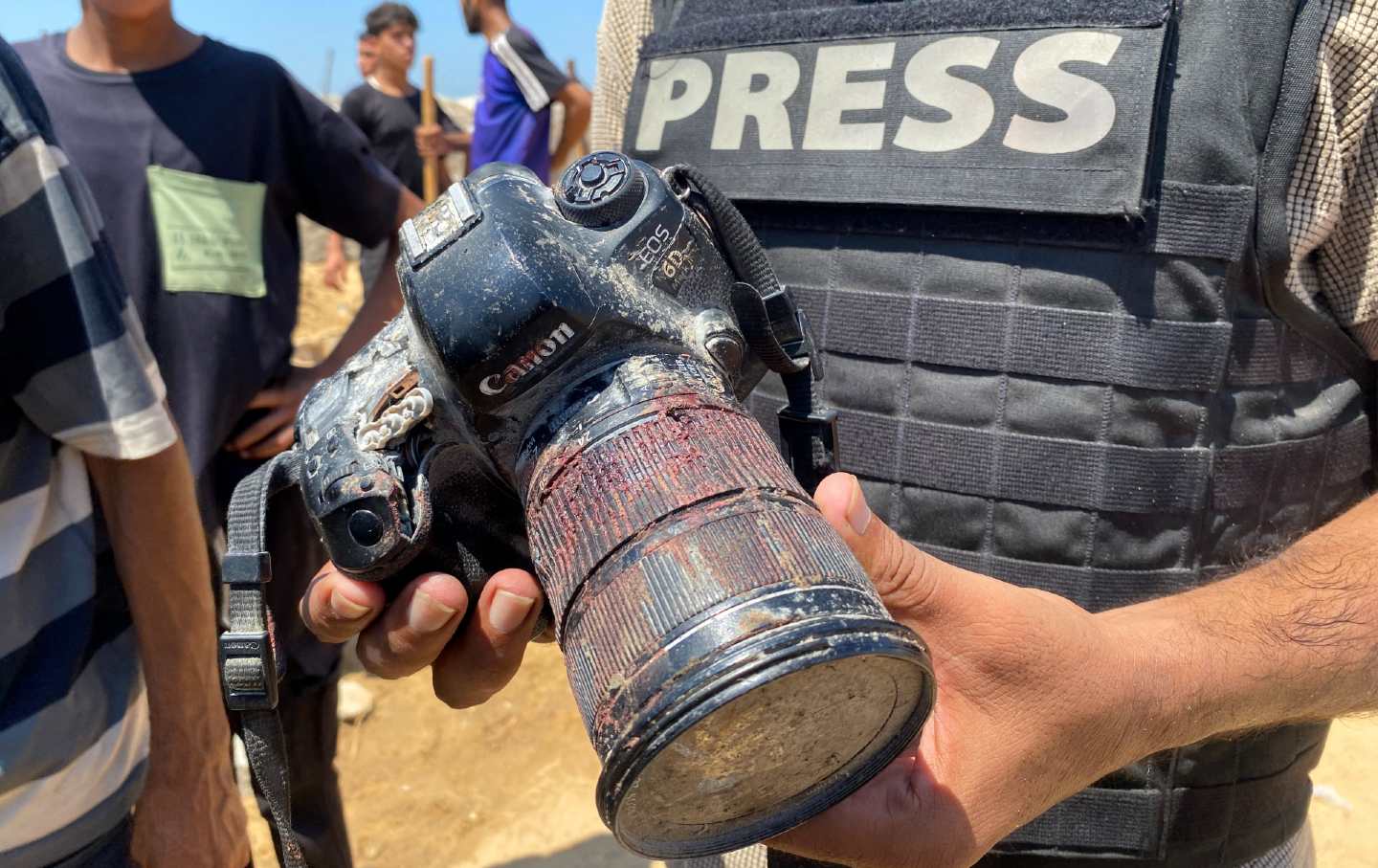
A journalist in Gaza debates whether to leave before his entire family is killed or stay so his people’s story is told.
Mohammed al-Sawwaf
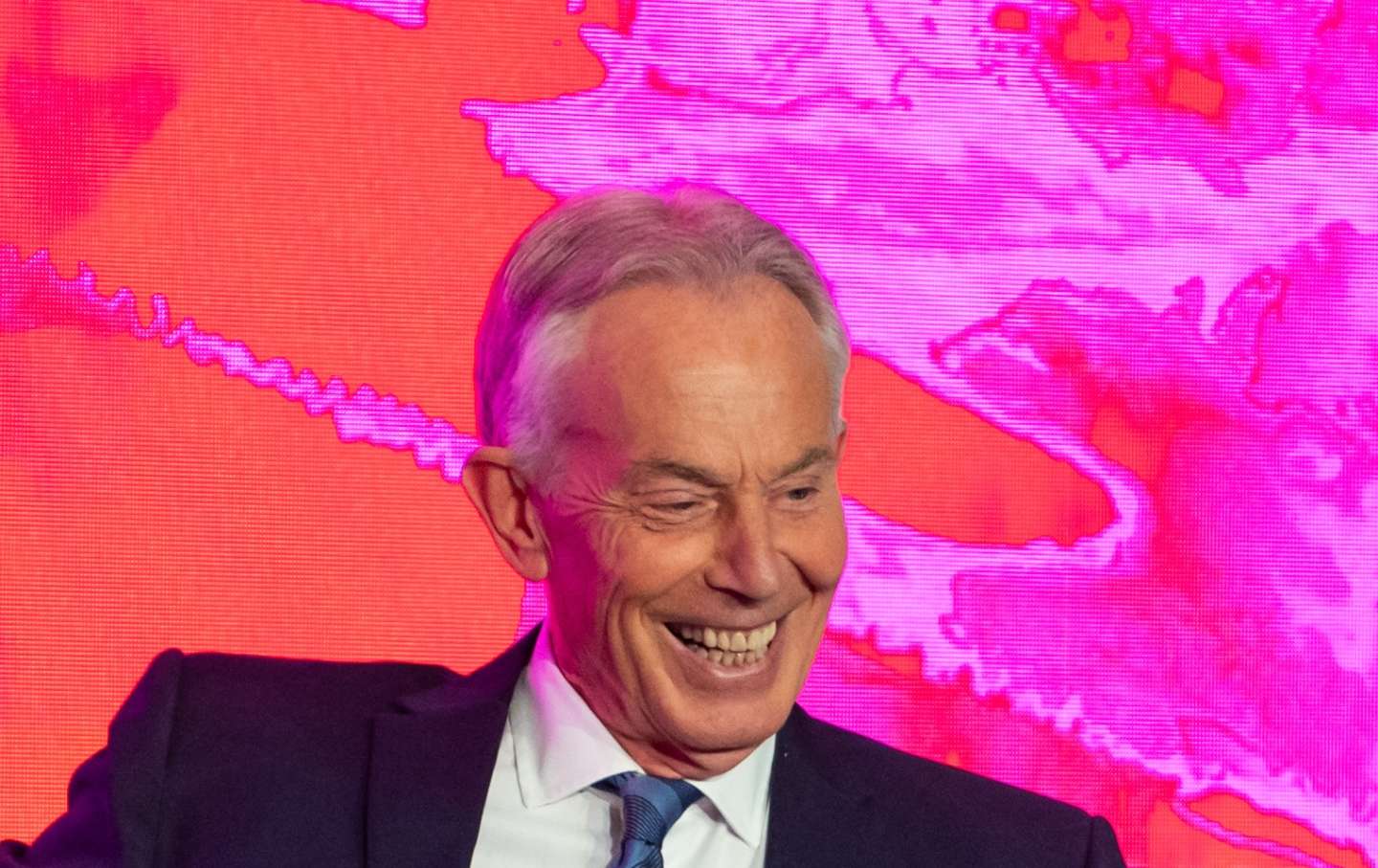
He needs to be in The Hague, not in charge of the future of Palestine.
Hamza Yusuf
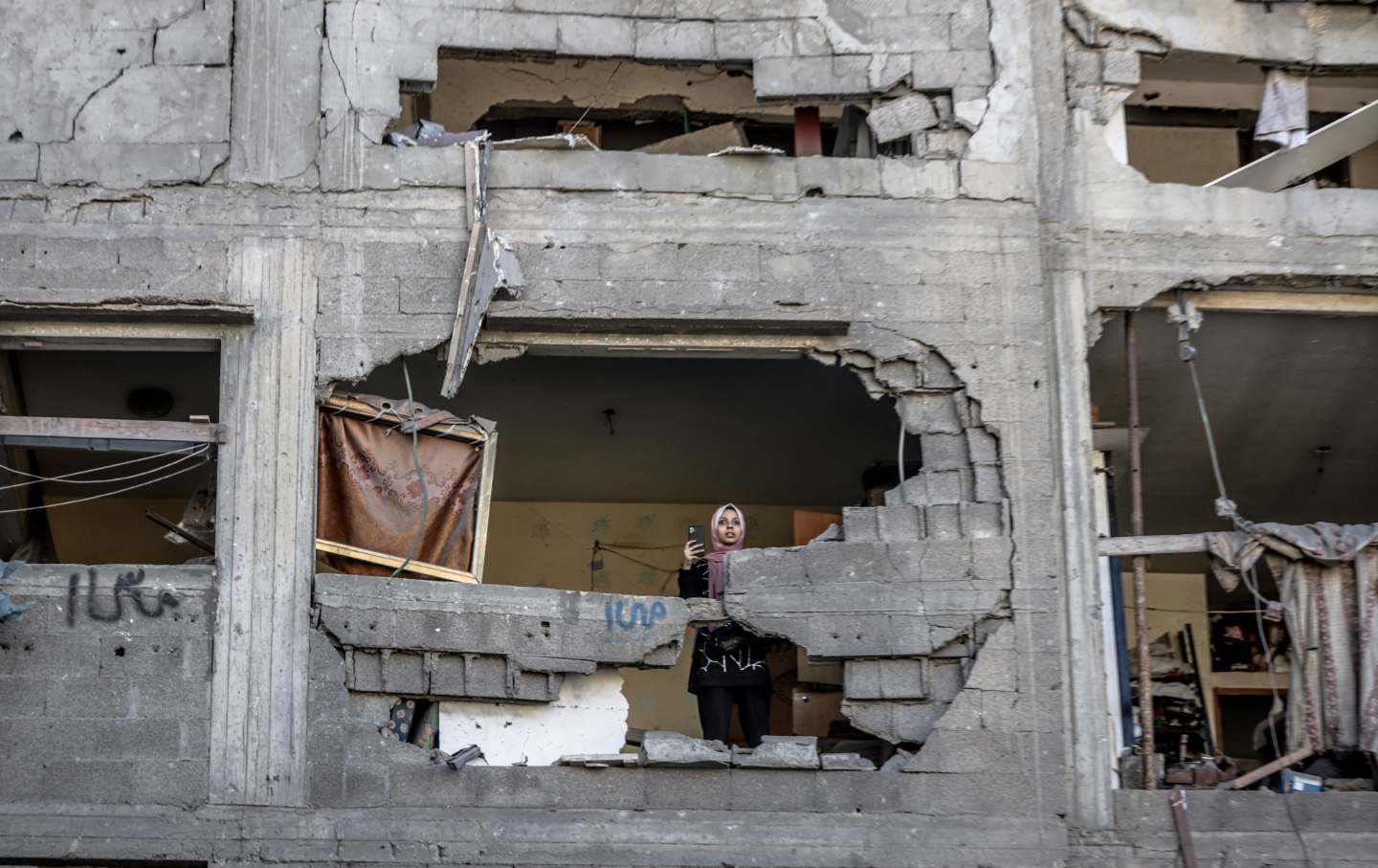
The human mind, faced with relentless pain, erects invisible barricades. Here, amid genocide, one of them is the ability to express our trauma out loud.
Taqwa Ahmed Al-Wawi
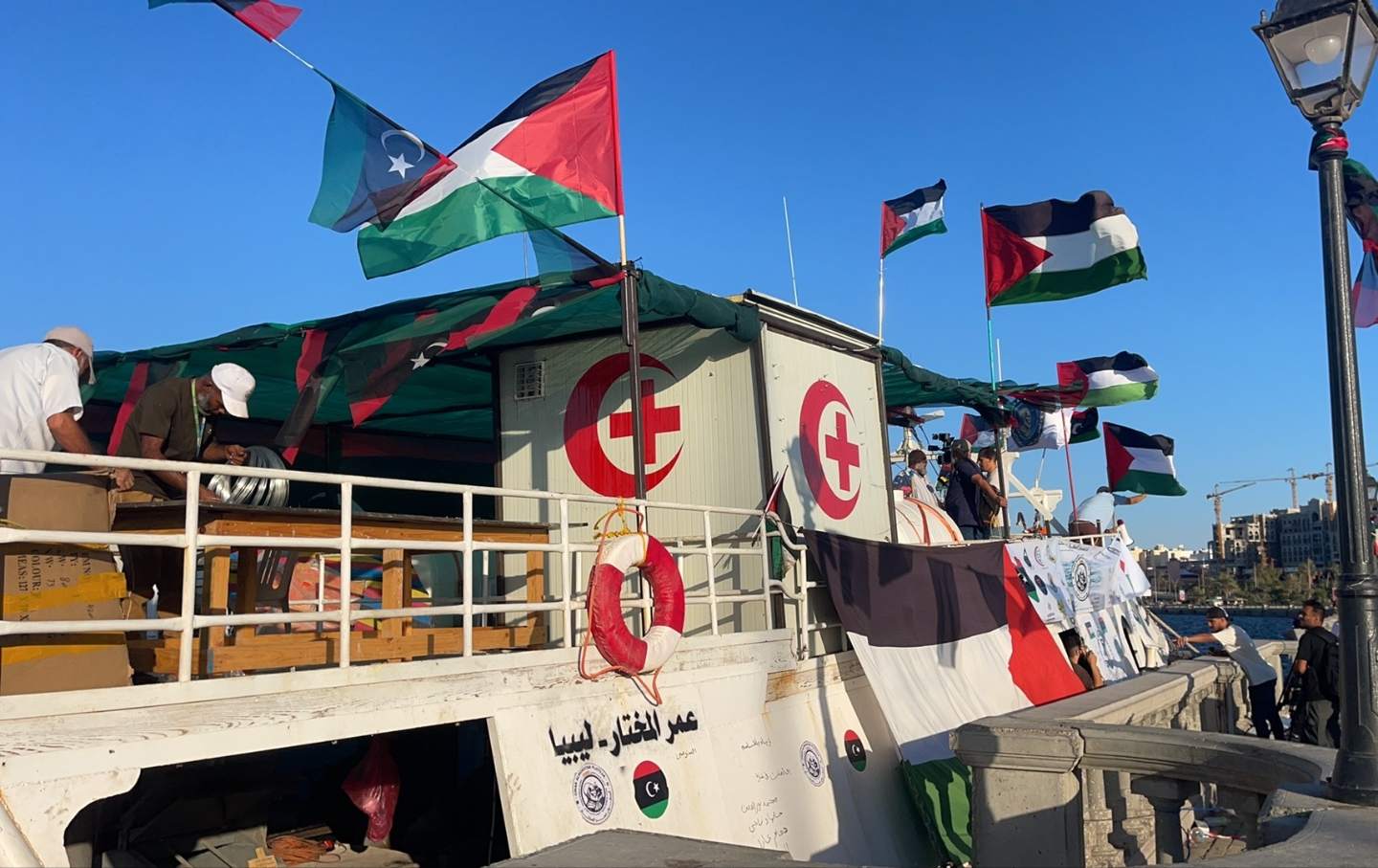
I hope that fellow Jews will join me in redefining their approach to atonement and move toward courageous action to put an end to this horrific genocide.
David Adler
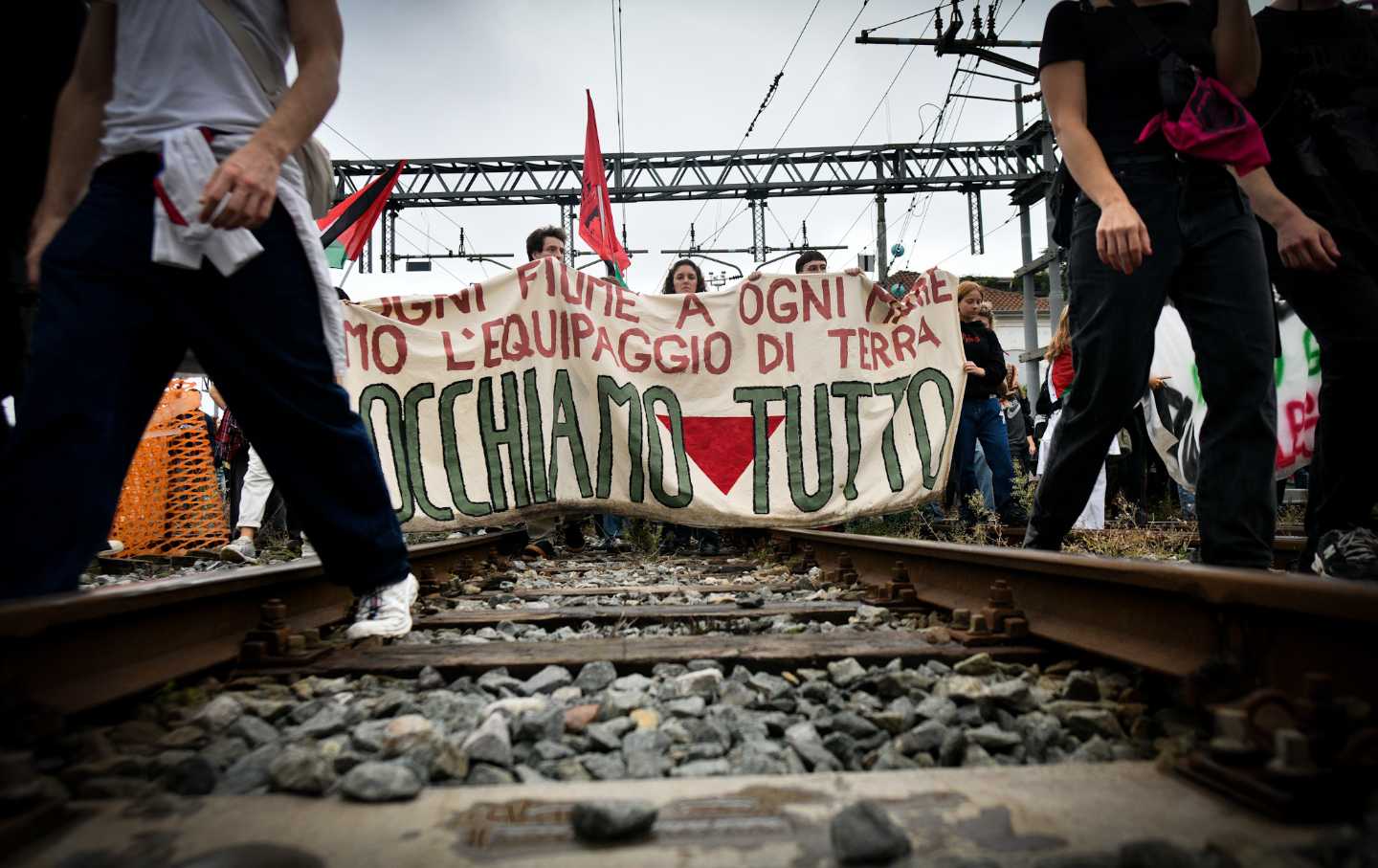
Hundreds of thousands blocked ports and roadways to demand an end to military collaboration with Israel.
Niccolò Barca
